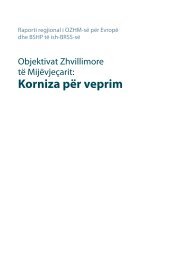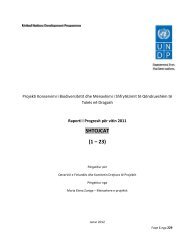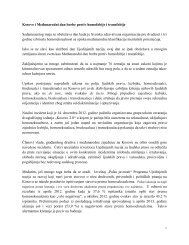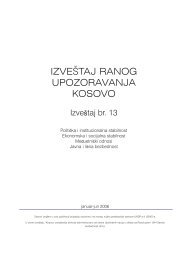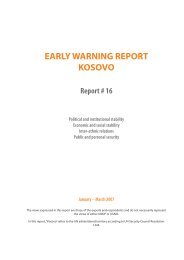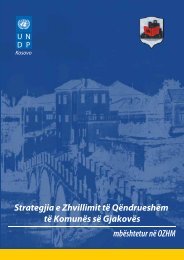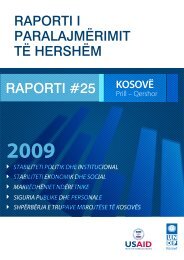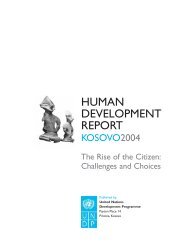Kosovo Human Development Report 2010 - UNDP Kosovo - United ...
Kosovo Human Development Report 2010 - UNDP Kosovo - United ...
Kosovo Human Development Report 2010 - UNDP Kosovo - United ...
Create successful ePaper yourself
Turn your PDF publications into a flip-book with our unique Google optimized e-Paper software.
to its society. A dramatic effort to bring<br />
new laws onto the books and adjust<br />
social policies has left less space for<br />
accountable implementation of these<br />
laws in ways that impact people’s lives.<br />
As a result, while <strong>Kosovo</strong>’s eventual<br />
destination should rightfully be<br />
as a full European partner – the road<br />
ahead seems very long and hard to<br />
a large proportion of Kosovan men,<br />
women and children. Their lives take<br />
an altogether different trajectory, one<br />
determined by the myriad social and<br />
economic challenges they face. These<br />
include:<br />
• Economic stagnation: <strong>Kosovo</strong> has<br />
struggled since 1999 to translate<br />
natural resources into productivity,<br />
revitalize non-state enterprises for<br />
private sector growth and create<br />
an investment-friendly business climate.<br />
Unsurprisingly, <strong>Kosovo</strong>’s GDP<br />
per capita is currently the lowest in<br />
Europe. Although the International<br />
Monetary Fund (IMF) has predicted<br />
it will grow by three percent annually<br />
from 1,766 to 2,360 EUR over<br />
the next six years, <strong>Kosovo</strong> has yet<br />
to demonstrate its capacity for inclusive<br />
and fair distribution of revenues<br />
throughout its society; 4<br />
• Widespread poverty: About 45 percent<br />
(just over 2 in 5 Kosovans) live<br />
below the World Bank poverty line<br />
and one in five is unable to meet<br />
their critical needs. Poverty is higher<br />
among those living in large families<br />
– which frequently have many unemployed<br />
members and relatively<br />
lower education levels. Those living<br />
in poverty are also geographically<br />
concentrated in the rural areas and<br />
in a few regions of <strong>Kosovo</strong> such as<br />
Prizren and Gjilan/Gnjilane; 5<br />
• High levels of unemployment: An estimated<br />
45 percent of the labour<br />
force is unemployed, with unem-<br />
18 | KOSOVO HUMAN DEVELOPMENT REPORT <strong>2010</strong><br />
ployment rates for youth at 73<br />
percent and women’s unemployment<br />
at 81 percent. The job market<br />
swells by an average 30,000 young<br />
jobseekers every year, with little<br />
opportunity available to them; 6<br />
Being young and unemployed makes<br />
a person handicapped in terms of<br />
future planning, such as marriage or<br />
having a family. You can become a<br />
burden to family and this often can<br />
create conflicts in family, which results<br />
in exclusion even from the family.<br />
Unemployed participant of a<br />
focus group<br />
• Poor quality of life: Kosovan men,<br />
women and children are falling<br />
behind the health and educational<br />
standards of their European neighbours.<br />
Health indicators in <strong>Kosovo</strong><br />
are among the worst in Europe. The<br />
infant mortality rate is 18-49 per<br />
1,000 and the under-five child mortality<br />
is 35-40 per 1,000 live births,<br />
thus representing the highest in<br />
Europe. High prevalence of tuberculosis<br />
poses another challenge<br />
for the health sector. 7 Education<br />
quality is also highly variable and<br />
selective - particularly for children<br />
with any form of physical or learning<br />
disability. Pre-school education<br />
is virtually non-existent outside of<br />
Pristina. Systematic environmental<br />
degradation also erodes quality of<br />
life. Contributing factors include<br />
outdated agricultural practices, land<br />
erosion through construction, uncontained<br />
industrial waste and uninformed<br />
lifestyle choices;<br />
• Pervasive discrimination: <strong>Kosovo</strong>’s<br />
ethnic minorities are much more<br />
likely to suffer the worst impact<br />
of <strong>Kosovo</strong>’s socio-economic chal-



